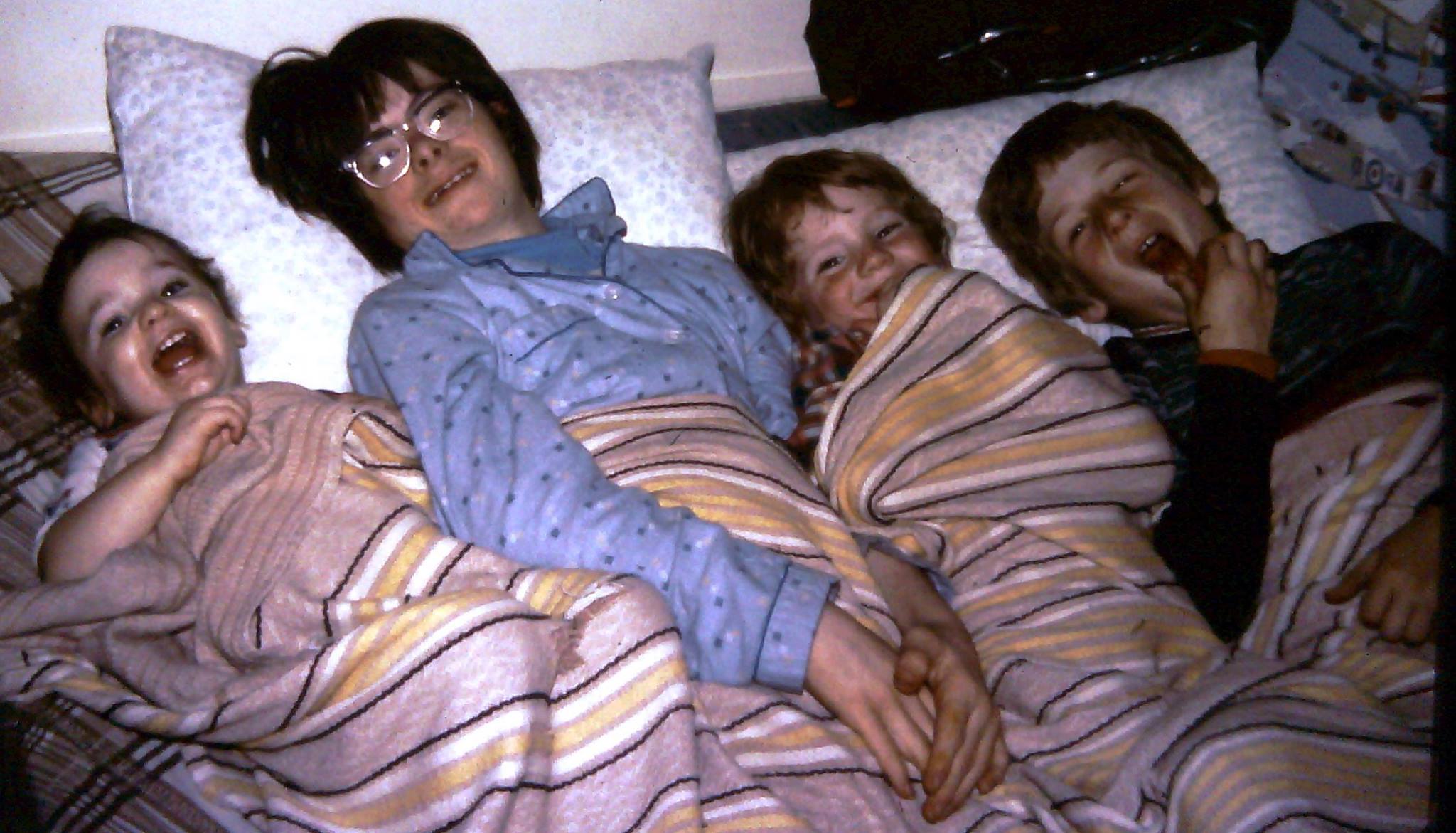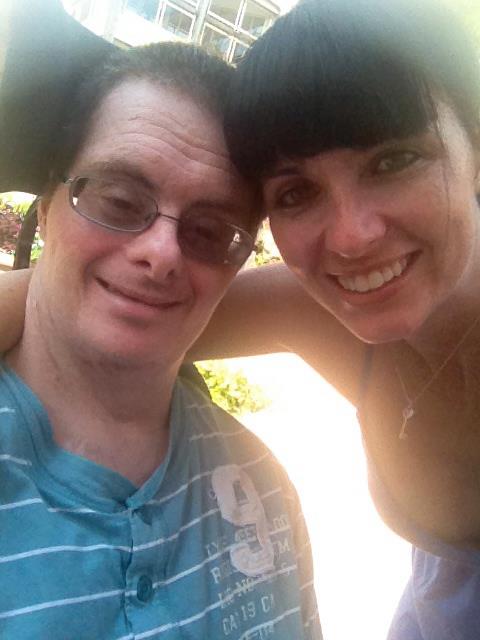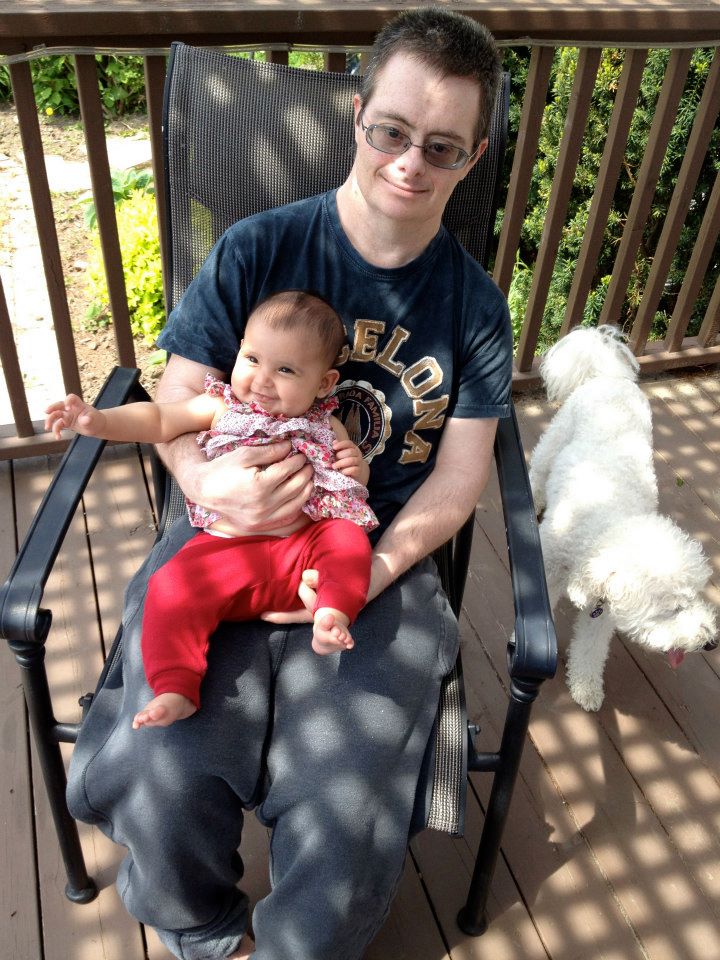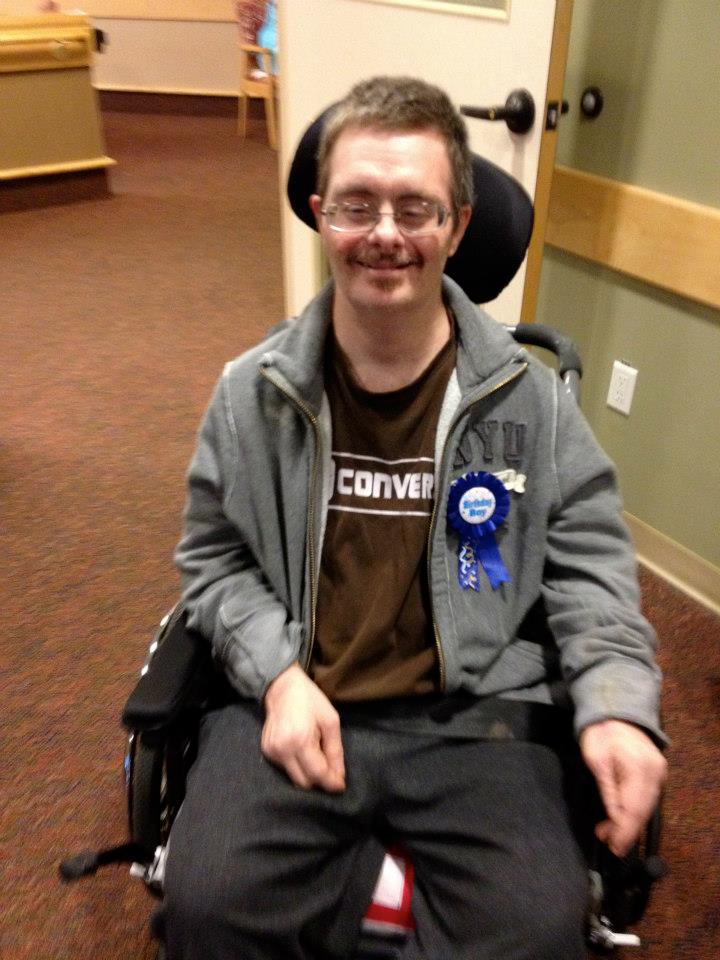Down Syndrome Awareness Month has come to an end, but luckily here in Canada, the first week of November is Down Syndrome Awareness week. So while a cold that has kicked my butt kept me from finishing my project for 31 for 21 project for this year, I’m happy to bring it into November as well.
As you know, I’ve been speaking about a thread that travels between the families of children with Down Syndrome, however I should be clear that this thread travels in many directions. In this golden age of the social media, so many of us are welcomed into a world wide community of Down Syndrome and when we have questions or the need to relate to someone else, we can simply open our phones or laptops and tweet, facebook or blog and our community appears. Even then, there are times where you can feel alone on this journey. As I’ve been thinking about this lately it has made me question what my ability to parent Lily would have been 10 or 20 or 30 years before this. When I met the amazing Jordan so many years ago, I absolutely took for granted how much time and effort his mother put in to raise him in a time where different was different and the stigma around disabilities was strong.
Just before Lily came home to us, I had the pleasure of meeting a woman named Jenna. She was friends with my sister and their sons were the same age. We were supposed to have a weekly swimming date but that was quickly interrupted when we learned that we had become Lily’s parents, but Jenna celebrated this moment in our lives as if she had known us for years and her excitement was contagious even to me and then she told me about her brother, Jeff. It wasn’t a long conversation, but enough to learn that her oldest brother had Down Syndrome and we talked a bit about what life was like for her growing up and for her parents in raising her brother during a time where it was far more common to send children to an institution and forget about them instead of bringing them home and loving them as just another family member. I knew this month that in sharing different voices of Down Syndrome, that I wanted Jenna and Jeff’s story to be heard. It’s the truthful story (including the truthful words of the time) of how life is not always perfect or filled with laughter and happiness. The struggles and hard times are real and were even more isolating without the amazing supports that parents and families have in place today. It’s the story that reminds us that when we feel overwhelmed at the road ahead, that we need to look back and see how far we’ve come and how many incredible people helped to build it.
Jeffrey Adam Tocher was a healthy baby boy born on August 31st, 1962. My parents were young and in love and completely unaware at how much their lives would change the day their first child was born.
Quickly after he was born, the doctors whisked Jeff away and examined him. They returned soon after to somberly inform my parents that their first-born baby was healthy…but unfortunately he was a “Mongloid.” My parents were sent home from the hospital with their new bundle with one bit of advice from the doctors: to have Jeff institutionalized as quickly as possible to lessen the burden of caring for him into adulthood. At the tender ages of 20 and 22, my parents made the enormous decision to care for Jeff at home and to raise him the way they had already planned to raise him: with love and devotion.
Though he was a healthy baby, raising Jeff was not without many challenges. My parents waited years for him to learn many of the basic skills that many babies and children learn with little to no effort. Breast feeding, bottle feeding, crawling, walking, toileting, talking, tying shoelaces…all of these milestones came with hours upon hours of hard work, repetition and determination. Despite his struggles, Jeff learned to crawl, then to walk. He learned to swim, to read a few words, to colour and to ride horses.
My Mom worked tirelessly with Jeff. There were no physiotherapists, occupational therapists, assistive technologies, speech and language pathologists; there were no respite options, support groups, internet, and very little valuable literature to consult for help. Everything that Jeff learned and achieved throughout his early years was because of the dedication and perseverance of my mother. My parents endured many years filled with stares and negative, unwanted comments about my brother from family and strangers alike. Despite all of this, they forged on…determined to protect Jeff and the rest of our family from those in the world who were cruel and unkind.
When Jeff reached school age he was permitted to attend the School for the Trainable Retarded Child. The children who attended this school varied wildly in their strengths and areas of need. But they did share one thing in common: the educators generally saw them as incapable of learning even the most basic academic skills. The primary goal for the children who attended this school was to learn skills that revolved around self care, cleaning and light cooking.
When Jeff reached high school age he was permitted to integrate into a ‘regular’ high school. He did this without the guidance of an educational assistant and without the support of an individualized education plan (IEP). Without any of these supports, Jeff was unable to cope in this new environment. Within a short time, the school staff told my parents that it would probably be best for everyone if Jeff stopped attending school. It was around this time that my parents connected with Community Living. They began the process of searching for a day-job for Jeff that would connect him with other young adults with special needs while providing him with the opportunity to engage in various work-related tasks each day. This was the first time my parents had been introduced to any kind of outside support and help for my brother. They welcomed it cautiously but optimistically. Jeff began working every day in a factory-type setting doing simple tasks like building wooden pallets and screwing washers onto screws. He earned around $25.00 every two weeks for his time.
Jeff was the oldest of my three brothers. Despite the 14 year age difference, I always felt as though we had a special connection; I felt a deep maternal responsibility for him from as early as I can remember. We worked and played together for hours on end throughout my childhood. He was always willing to play whatever games I desired, long after my other brothers decided that they were too old and too big to play with me. He was forever a child, full of wonder and joy. I looked up to him as my big brother; but I also felt the urge to try to protect him from the world as though I was his older sister. Despite this complex relationship, I was the youngest and he was the oldest. At times, this unique dichotomy was challenging for me to process.
In the late 80s there was a television show called The Facts of Life, which starred ‘Corky’, a young man with Down Syndrome. The media raved about what a wonderful and unique time in television history that we were witnessing a man with developmental delays starring in a television show. The show won various awards and enjoyed a 4 or 5 year run.
‘Corky’ was higher functioning than my brother but they were around the same age.
I remember cringing when I heard the kids at school making fun of Corky countless times. In our high school, it was an ongoing joke for many of my peers to mimic his voice, and to repeat the phrases he would use in the show. Several kids in my school would use the word “Corky” as a term to mean “dumb” when they were insulting each other. “Oh he’s just being a Corky!” they would say to each other.I was around 13 at the time and not brave enough to intervene or to ask them to stop. I remember shouting at them in my head for being so cruel and hateful. In my mind, I had a plan of hundreds of things I could say to them to make them stop mocking this actor on tv who so closely reminded me of my brother. But unfortunately, at this point in my life I did not have the courage to speak those words. I raged inside but said nothing. All I could think of was that ‘Corky’ was so much smarter than my brother. I shuddered to think of the jokes that they would make about Jeff if they knew him. Deeply ashamed, I kept the details of our family very private during this time in my life.
Jeff was an amazing swimmer. He had the most hilarious sense of humour. He rode horses when he was young. He loved to watch wrestling and hockey. He adored music and dancing. He loved Christmas and Santa Claus. He was the kindest person I knew. He did not judge. He held no prejudice. He forgave easily. Hate was not a part of his vocabulary. He was an easy person to love.
My brother was one of the most influential people in my life. Though it took me many years, it was because of him that I learned how to be an advocate for those who were rendered voiceless. My relationship with Jeff taught me that we are all precious beings who deserve to be treated with love, dignity and respect.
After the loss of our Dad to cancer, Jeff struggled with depression and anxiety. He began a slow, ten-year decline in his health. He was less interested in swimming and going to work each day. The level of physical and emotional care that Jeff required increased dramatically during this time. There were numerous violent outbursts at home when he became frustrated or overwhelmed. There were also moments of deep sadness and sorrow that would consume him at times for months on end.
When he turned 50, Jeff began his struggle with Alzheimer’s disease. During his final year, he did not recognize me. When I visited, I would hold his hand while he watched television. Sometimes we would sit in silence outside in the warm sun. He was in a wheelchair in the end, limited to eating puréed food and becoming less and less interested in doing much else than watching tv. He would have a few lucid moments where he would smile and chat but for the most part it seemed as though the Jeff we all knew and loved was gone. He was hardly the young man who out-swam us all in our family pool every summer.
During one of our last visits, I fed him his dessert and watched him eat. When he finished, he asked me about his sister, Jenna. He asked me if she was coming to visit him today. He obviously did not recognize that it was his sister, who fed him that dessert. Despite the obvious sadness of this scenario, the happiness in his face when he spoke of me brought me such peace. He did not recognize my physical presence that day, but it did not matter. I knew in that moment when I saw the happiness in his eyes when he spoke of me, that our spirits would be connected in perpetuity. Not long after that visit, Jeff passed away. He was in his 52nd year. Though I can’t help but feel as though his time to go came too soon, I am forever grateful for all of the lessons that he taught me. There will never be another Jeff. I miss him.



